New Cilento REGENERATIVE ORGANIC AGRICULTURE
THE PRINCIPLES OF ORGANIC REGENERATIVE AGRICULTURE
"A good farmer loves
and regenerates the life of the land"
- Analysis of functions suitable for regeneration
- Soil regeneration
- Exaltation of biodiversity
- Autonomy and elimination of synthetic products
- Sustainable resource maximisation
- Understanding the function of ingredients
- Recovery of peasant knowledge
- Use of modern scientific knowledge
- Sharing doubts and results
- Creation of social and economic networks
- Cohesive relationship between city and countryside
A new model of
agriculture
for the Cooperativa Nuovo Cilento
The Cooperativa Agricola Nuovo Cilento is committed to the study and implementation of techniques that combine past knowledge and technological innovation for a more sustainable model of agriculture that is adopted by our members.
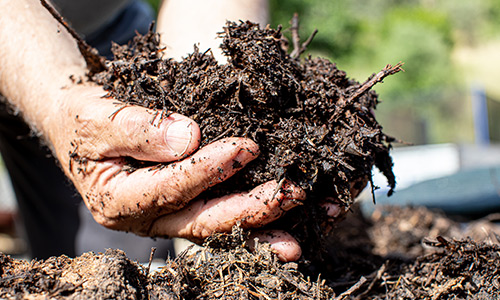
Composting of processing waste
Composting consists of a process of bioxidation in our case of pomace, leaves and pruning residues. The project started in November 2018 thanks to the CNR of Perugia, with the technical assistance of prof. Giuseppe Fontanazza and the collaboration of the Cilento Park, Deafal of Milan, the universities of Salerno and Potenza, the RETE HUMUS association, which made a decisive contribution. We were the first in Italy to have achieved more concrete results, with the creation of an original recipe for the mixture of pomace with the various natural residues of the mill. Today we produce 1500 ql of compost used by our members in olive groves and vegetable gardens with excellent results.
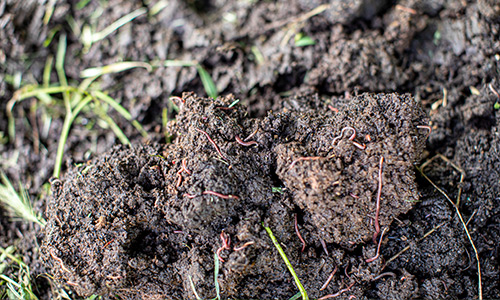
Earthworm composting of pomace
Earthworm composting allows everyone to produce compost from organic waste and vegetable food waste that will be digested by earthworms. The resulting compost is particularly rich and can be used to fertilize olive groves, vegetable garden, garden or potted plants. Basically it consists in reproducing the ecosystem’that exists in nature, in which the function of the earthworm is, among others, to decompose organic substances. The earthworm production process does not give off unpleasant odours if carried out in optimal conditions. The Nuovo Cilento cooperative produces earthworms composted from olive pomace and restaurant waste.
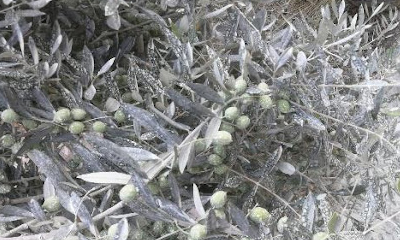
Biological pest control with Manisol and self-produced adhesives
Kaolin is used and allowed in organic farming. It is in fact an excellent invigorating agent of natural origin and is recommended especially in olive growing for the defense of the olive fly and for the reduction of thermal stress. In the case of olive growing, kaolin manages to create an environment hostile to the attack of the fly, creating both a loss of orientation of the parasite, and a mechanical resistance to oviposition following the hardening of the olive skin. In addition, the use of self-produced adhesives such as macerated prickly pear blades and viscous inula favor the persistence of kaolin even after heavy rains.
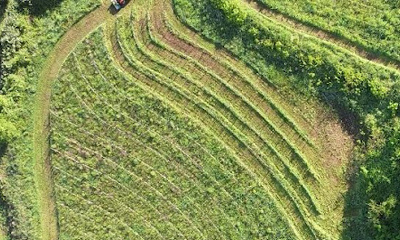
Water management via keyline
The practice of the keyline consists in the efficient management of rainwater along key lines and through the use of furrows or walkways with certain slopes and sizes based on the morphology and rainfall of a given terrain. The use of this technique favors the increase of fertility in the soils and the decrease of erosion phenomena.
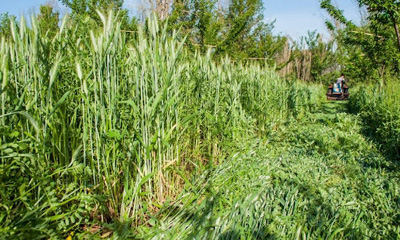
Practice of green manure and subsequent mowing or lactation
Green manure is an agronomic practice that consists in sowing a herbaceous nitrogen-fixing crop as pure or associated legumes, intended to be totally mowed or bedridden, depending on the fertilizer of the crop that succeeds it or of the olive grove within which it was sown.
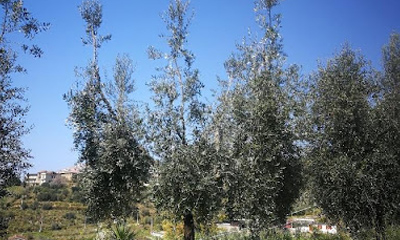
Polyconic pot pruning
The polyconic vase is one of the most widespread training systems for the olive tree. The structure consists of an open shape in the center, with foliage consisting of 3 or more distinct units of conical shape. The main advantages of this technique are the reduction of alternation of production, the reduction of pruning times and the prevention of fungal diseases thanks to the greater exposure of the foliage to light.
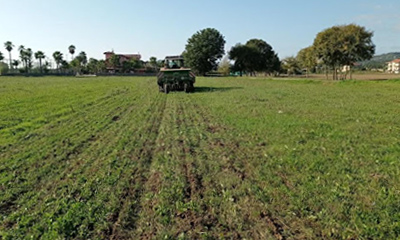
Surface processing techniques or minimal tillage
The techniques of surface processing or minimum processing consist in the use of a series of tools that replace deep plowing with a processing a few cm deep with harrows and disc plows or superficial such as, for example, the soda seeder reducing costs and mitigating the actions of disturbance to the ground caused by plowing.
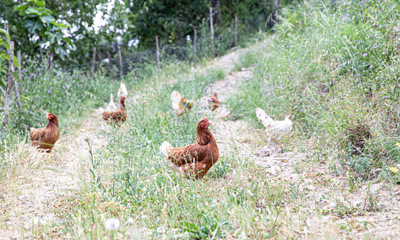
Rational grazing animal management
Rational grazing is a modern breeding technique that consists in the management of pastures through the division into lots or the use of mobile stables or chicken coops respecting the natural balance of the soil, fodder, and crops in which the animals graze. Particularly suitable for sustainable farming that respects the environment, biodiversity and animal welfare.
The products
Enjoy the fruits of our work directly at home: it is the first step to a Mediterranean, genuine, happy lifestyle.
We apply the techniques of Organic and Regenerative Agriculture to bring extra virgin olive oil, legumes, flours, sauces, preserves and wines to the table.
New Cilento
AGRICULTURAL COOPERATIVE

shop online
Oil, legumes, preserves, pasta, sauces, wines. Discover and buy online the excellence of the Cooperativa Nuovo Cilento.
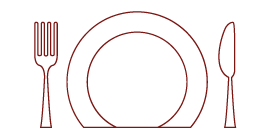
RESTAURANT AL FRANTOIO
From the land to the table. Everything we produce becomes the protagonist of experiences of pure Cilento taste in our restaurant.

EDUCATIONAL FARM
Environmental, sensory and nutritional education. Discover our educational paths and workshops for schools, companies and researchers.
Contact Us
Do you have a question, a request, a proposal or a curiosity about the Nuovo Cilento Cooperative?
Fill out the form: we will reply as soon as possible.
"*" indicates required fields
